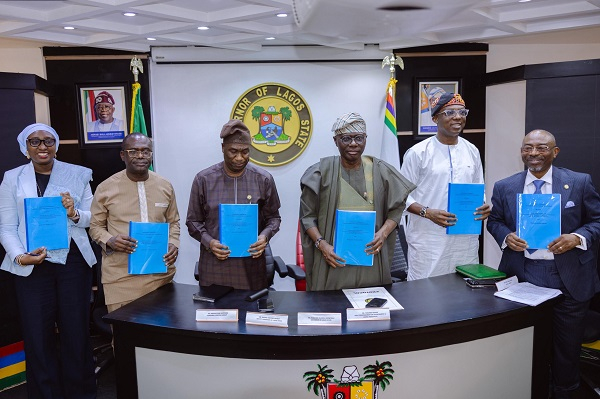Sanwo-Olu lauds Tinubu's bold reforms
Governor Babajide Sanwo-Olu of Lagos State has hailed the administration of President Bola Ahmed Tinubu, describing the first two years of his presidency as a period marked by bold reforms, transformative policies, and “positive indicators” pointing toward economic and national revival.
In an opinion piece released on Saturday, Sanwo-Olu offered a comprehensive review of Tinubu’s tenure so far, asserting that, while challenges remain, the trajectory of governance under the All Progressives Congress (APC)-led federal government is decisively upward.
Recounting Tinubu’s now-famous inaugural declaration – “Subsidy is gone and gone for good” – Sanwo-Olu noted that the president’s stance on removing fuel subsidies marked a turning point in Nigeria’s economic direction. According to him, this decision, though initially painful for many Nigerians, has since ushered in a wave of strategic reforms aimed at long-term national benefit.
“The removal of subsidy, though sudden and jarring, was necessary,” Sanwo-Olu wrote. “President Tinubu followed it up with palliatives and initiatives like the deployment of Compressed Natural Gas (CNG) buses, saving the country over N1 trillion monthly in importation costs.”
Sanwo-Olu also highlighted the floating of the naira and the unification of the foreign exchange system as courageous steps aimed at stabilising the economy and eliminating distortions in currency markets.
“While the naira is not fully stabilised yet, the spiral has been halted and a rebound is anticipated,” he said, referencing improved foreign direct investment (FDI) inflows and a growing external reserve.
The governor pointed to significant infrastructure projects—including the Lagos-Calabar Coastal Highway, the Sokoto-Badagry Highway, and ongoing rail and power projects—as evidence of Tinubu’s commitment to balanced national development. He noted that such projects had not only defied initial criticism but had become “positive indicators” for potential investors.
Other key policy moves under Tinubu, as cited by Sanwo-Olu, include the Student Loan Scheme, Consumer Credit Corporation, Digital and Creative Enterprises programme, and extensive support for small and medium-scale businesses. He revealed that over N95.6 billion had been disbursed in student loans and over N570 billion released to states for livelihood support, with nano-businesses also receiving significant backing.
In terms of fiscal performance, the Lagos State governor said Nigeria’s government revenue had more than doubled in the first half of 2024 compared to the same period in 2023, citing a N9.1 trillion increase. He further praised the recent signing of a new National Minimum Wage of N70,000 and the provision of N1 billion grants to large-scale manufacturers as major milestones.
Sanwo-Olu also lauded Tinubu’s push for financial autonomy for local governments, stating it was necessary to ensure development reaches the grassroots. Citing Lagos’ own successful model, he said true autonomy at the local level was key to unlocking national progress.
While acknowledging lingering security concerns, Sanwo-Olu said the administration’s efforts had significantly weakened “anti-social elements,” with the security apparatus steadily regaining control. He expressed optimism that peace and order would soon be fully restored across troubled regions.
Reflecting on the nation’s democratic health, he observed a surge in political defections into the APC as an endorsement of Tinubu’s leadership, noting that such moves were not coerced but driven by shared vision and conviction.
Sanwo-Olu concluded by urging Nigerians to remain patient and support the administration’s policies, insisting that “the train has since May 29, 2023, left the station and is moving at a reasonable and promising pace to a better destination.”
“Though it is not yet uhuru,” he said, “the indicators are positive, and President Tinubu deserves credit for steering the nation through turbulent waters with courage, clarity, and commitment.”
The article comes as the Tinubu administration marks its second anniversary amid mixed public reviews, with supporters touting ongoing reforms and critics pointing to persistent economic hardship.









